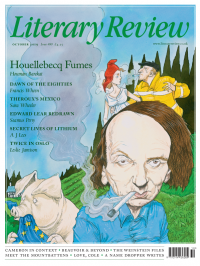Theodore Dalrymple
It Could Be Verse
Is it my imagination, or have they turned down the volume of the pre-recorded muezzin calls in Turkey this year? Perhaps it is only that my hearing has grown less acute with age. After all, I learned that I was short-sighted many years ago by complaining at a clinical pathology conference that the pathology slides shown were nothing but a pink and blue blur, having assumed that the problem was with the slides rather than with my eyes. The subject of my talk in Turkey was the social changes in Britain discernible from a comparison of the crime novels of Agatha Christie and Ian Rankin. I accept that there was nothing scientific about my method – it was like trying to examine the effects of the French Revolution by comparing Molière with Céline – but all the same I couldn’t help feeling that there was something to my approach. For example, one couldn’t imagine either Hercule Poirot or Miss Marple chewing gum, as Rebus does, or taking gum out of their mouths and dropping it on the pavement, as Rebus also does. Neither could I imagine either of Agatha Christie’s sleuths listening, like Rebus, to the music of a band called Spooky Tooth.
While both writers are witty, Christie is cosily comforting and Rankin is anxiety-provoking. In preparing my talk, however, my main pleasure was in rereading Francis Iles’s novel Malice Aforethought, a wonderful comedy of manners, in which the hero, Dr Bickleigh, is acquitted of a murder that he did commit and

Sign Up to our newsletter
Receive free articles, highlights from the archive, news, details of prizes, and much more.@Lit_Review
Follow Literary Review on Twitter
Twitter Feed
The era of dollar dominance might be coming to an end. But if not the dollar, which currency will be the backbone of the global economic system?
@HowardJDavies weighs up the alternatives.
Howard Davies - Greenbacks Down, First Editions Up
Howard Davies: Greenbacks Down, First Editions Up - Our Dollar, Your Problem: An Insider’s View of Seven Turbulent...
literaryreview.co.uk
Johannes Gutenberg cut corners at every turn when putting together his bible. How, then, did his creation achieve such renown?
@JosephHone_ investigates.
Joseph Hone - Start the Presses!
Joseph Hone: Start the Presses! - Johannes Gutenberg: A Biography in Books by Eric Marshall White
literaryreview.co.uk
Convinced of her own brilliance, Gertrude Stein wished to be ‘as popular as Gilbert and Sullivan’ and laboured tirelessly to ensure that her celebrity would outlive her.
@sophieolive examines the real Stein.
Sophie Oliver - The Once & Future Genius
Sophie Oliver: The Once & Future Genius - Gertrude Stein: An Afterlife by Francesca Wade
literaryreview.co.uk